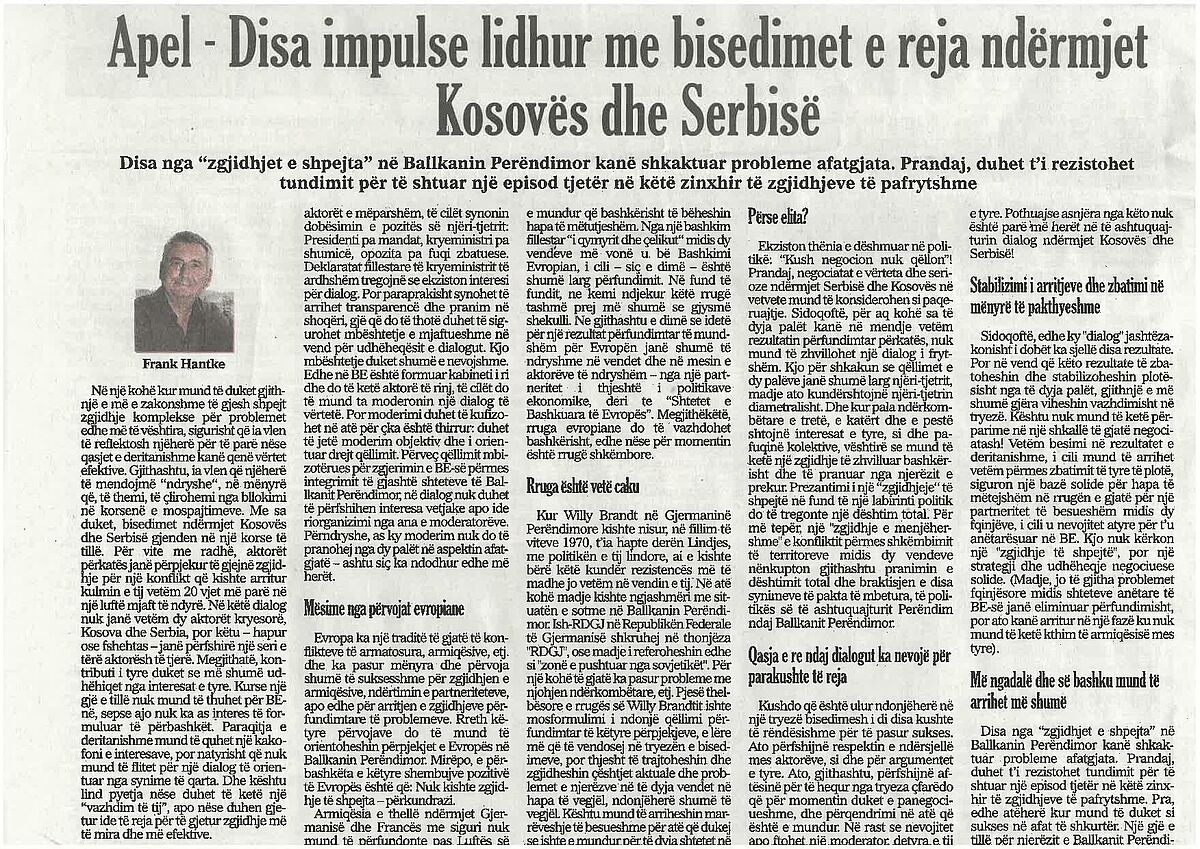Country Director of FES Prishtina Office wrote a piece for new impulses towards the Kosovo-Serbia dialogue.

Interjection - impulse for new talks between Kosovo and Serbia
In a time when it continuously seems that difficult problems are tempted to be solved through quick complex solutions, it would be worth-considering, to first stop and observe, in order to reflect if the approaches taken until now have reached their target effectively. And it would also be worthwhile to think "differently", in order to be freed from the corset of deadlocked opposites.
In such a corset, one can see the talks between Serbia and Kosovo through the so-called Dialogue. For many years now, these two actors have tried to find solutions due to their conflict, which 20 years ago reached its’ peak when a filthy war took place. Part of this scene are not only the two main actors, namely Kosovo and Serbia, but also a wide variety of additional actors who intervene as well- either openly or behind the scenes. And their contribution seems to be guided from Western interests. But in the case of the EU, one cannot say that it is the same case, because the EU does not have a joint formulated interest to follow. The present appearance can therefore be called a cacophony of interests, but certainly not a goal-oriented dialogue. And so, the question arises whether there should be a "thumbs up" to how the process is going, or whether new ideas need to be found in order to find better and more effective solutions.
New key players take their seats at the table
In Kosovo, a new government is currently being formed with coalition partners who have been against the previous "form of dialogue". They will certainly want to act differently than the previous players, who have also dug each other's water: A President without a mandate, a Prime Minister without a majority, oppositionists without assertiveness. Initial statements by the designated Prime Minister show that people are very interested in the Dialogue. But before that, they need to find transparency and acceptance in their own countries, i.e. enough support for the negotiators on the Kosovar side. This is necessary.
There is also a new Cabinet being formed at the EU level, and there will be new actors who could moderate a real Dialogue. However, then this moderation should be limited to what they are there for: an objective and goal-oriented moderation. Any self-interest - beyond the overall goal of EU enlargement to the 6 WB countries - or even their own ideas on a reorganization should of course be avoided from the moderator side. Otherwise, this moderation would hardly retain a long-lasting acceptance from both sides - as has happened so far.
Learning from European experiences
Europe has a long tradition of armed conflicts, hostilities, etc. And there have been very successful ways and experiences of dissolving hostilities, building partnerships, or even reaching final solutions to problems. This could also be applied at the current efforts of the entire Europe in the Western Balkans. One thing is common to the positive examples: there were no quick solutions - on the contrary.
The deep-seated enmity between Germany and France for example could certainly hardly be ended after World War II with a quick solution that would have been universally accepted. Instead, it took many small steps to reach agreements in the event of partially shared interests, the implementation of which could initially build trust. On these results, further steps could be tackled together. An initial coalition between the two countries soon became the European Union, which, we know, is far from over. After all, we have been following this path for well over half a century now. We also know that the respective ideas for a possible result for Europe are very different in the countries and among the different actors - from a mere, rather economic-contractual partnership to the "United States of Europe". Nonetheless, the European way will continue to be shared, even if it is appears to be “frozen” at the moment.
The path is the goal
When Willy Brandt began to open the door to the East with his Eastern policy in West Germany in the early 1970s, he did so against the greatest resistance not only in his own country. At that time, there were even similarities with the situation in the Western Balkans. The former GDR was still written in the Federal Republic of Germany with quotation marks "GDR", or even referred to as "Soviet-occupied zone". There were long-standing problems with international recognition, and so on. An essential part of Willy Brandt's path was not to formulate any end goal of these efforts, let alone put them on the negotiating table, but merely to burn issues ongoing during that time, and solving issues for people in both countries through the smallest steps possible. Thus, reliable agreements could be reached for what seemed to be possible for both states at that time. And here, too, there have been sometimes setbacks, but the solidity of the path was assured by never playing "all or nothing". At that time, even the greatest optimists, at the beginning of these efforts did not expect that the unification of Germany would happen 20 years after.
Why the rush?
There is the well-known expression in politics which goes, "he who negotiates, does not shoot!" Therefore, real and serious negotiations between Serbia and Kosovo alone are to be considered as peacekeeping. However, as long as both sides have only the respective end result in mind, it cannot lead to a fruitful dialogue. Because the two objectives are too far apart, yes, they contradict each other diametrically. And when the third, fourth and fifth international sides add their own interests as well as collective helplessness, there can hardly be a solution actively developed and practiced by the affected people. To offer a "solution" followed by an applause of ending this political labyrinth is what leads to the chaos. Moreover, an "immediate solution" of the conflict for the two countries would include the following, the land swap agreement, the acknowledgement of the complete failure and also the withdrawal of the few, remaining goals of a West-Balkan-Politics of the so-called West.
A new approach to dialogue needs new prerequisites
Anyone who has ever sat in a negotiating table knows some important conditions for success. This includes the mutual respect of the actors as well as their arguments. This includes also the ability to remove from the table, everything that at the moments seems non-negotiable, and instead urges for focus on what is still possible. If a moderator is needed or invited to do this, his/her task must be to neutralize the possibilities that result from the Dialogue of the dialogue leaders. A final but essential point is that the actors each speak "with just one voice". In our case, they also need the general approval of the people in their countries for each position. Out of these points, hardly anything has been seen until recently in the so-called Kosovar-Serbian Dialogue!
Stabilizing what has been achieved and anchoring it irreversibly
Nevertheless, even this extremely poor "Dialogue" has yielded some results. But instead of fully implementing and stabilizing these results on both sides, more and more things have constantly been put on the table. Hence, one cannot make progress on a long staircase of negotiations! Only trust in the achieved results so far, which can only be gained through their full implementation, provides a solid basis for further steps on the long road to a dependable partnership between the two neighbors, which they need to become a member of the EU. And this requires no "quick fix", but a sound negotiation strategy and leadership. (Incidentally, not all neighborhood problems between today's EU Member States have been finally eliminated, but they have reached a stage where the return to hostility between them is no longer possible.)
Slowly and, above all, achieving more together
Some "quick fixes" in the Western Balkans have been causing long-term problems. Therefore, such temptation should be resisted in order to prevent the extension of the link to this chain of fruitless solutions. This should apply also in case a success is reached even in the short run. And this is quite different for the people of the Western Balkans. Therefore, they should be taken through a long and dedicated journey. They should not be the victims of quick "deals" again.
Friedrich-Ebert-Stiftung
Kosovo
Pashko Vasa Str. 23
10000 Prishtina
Republic of Kosovo

